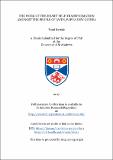Files in this item
‘The work of the heart’ : self-transformation amongst the people of Awim, Papua New Guinea
Item metadata
| dc.contributor.advisor | Toren, Christina | |
| dc.contributor.author | Bartole, Tomi | |
| dc.coverage.spatial | 364 p. | en_US |
| dc.date.accessioned | 2019-07-01T10:45:49Z | |
| dc.date.available | 2019-07-01T10:45:49Z | |
| dc.date.issued | 2017-06-20 | |
| dc.identifier.uri | https://hdl.handle.net/10023/18011 | |
| dc.description.abstract | This thesis analyses a significant shift in how Awim people in the East Sepik Province, Papua New Guinea, conceive of, experience and talk about themselves, their relations with one another, and their world. My ethnographic analysis uses Awim categories to reveal processes of transformation and continuity, in particular the transformation of a ritual form and its eventual abolition. In the Awim world every living being has a 'heart' (manga) – life itself – that metamorphoses from fruit to seed and from seed to fruit, engendering a container. When 'heart' (manga) is made verb (mangananm), the 'work of the heart' is evinced as the continuing constitution anew of a spiral-form. The ‘work of the heart’ is materially effective thoughts that may be found on the spiral boundaries that traverse the body's flesh, coincide with the finger tips, the words of my mother's brother or dwell between two moving hands in a problem-solving ritual called 'the handshake'. My analysis begins with people's concerns about the precariousness of the world and problematic relations, which were especially dangerous. Attempts to ‘straighten’ relations were made through ‘the handshake’ ritual, in which two persons stand facing each other shaking hands and expressing their regrets. In presenting three case-studies I describe how ‘the handshake rituals’ were rendered efficacious, and also their limits, which materialized once the problems in the village were deemed to be grounded first in witchcraft and later in sorcery. Conscious of the limits of ‘the handshake’ ritual, people resorted to the revival of a local religious movement called The Michael Angel Ministry. After the Ministry solved the village's problems the people were most interested in preserving Michael's otherwise intermittent power through the restructuring of the Ministry. One of the provisions included the abolition of ‘the handshake’ ritual inside the Ministry and with it a significant shift occurred. | en |
| dc.language.iso | en | en_US |
| dc.publisher | University of St Andrews | |
| dc.subject.lcc | DU740.42B288 | |
| dc.title | ‘The work of the heart’ : self-transformation amongst the people of Awim, Papua New Guinea | en_US |
| dc.type | Thesis | en_US |
| dc.contributor.sponsor | Slovene Human Resources Development and Scholarship Fund | en_US |
| dc.contributor.sponsor | University of St Andrews. Department of Social Anthropology | en_US |
| dc.type.qualificationlevel | Doctoral | en_US |
| dc.type.qualificationname | PhD Doctor of Philosophy | en_US |
| dc.publisher.institution | The University of St Andrews | en_US |
| dc.publisher.department | Department of Social Anthropology | en_US |
| dc.identifier.doi | https://doi.org/10.17630/10023-18011 |
This item appears in the following Collection(s)
Items in the St Andrews Research Repository are protected by copyright, with all rights reserved, unless otherwise indicated.

